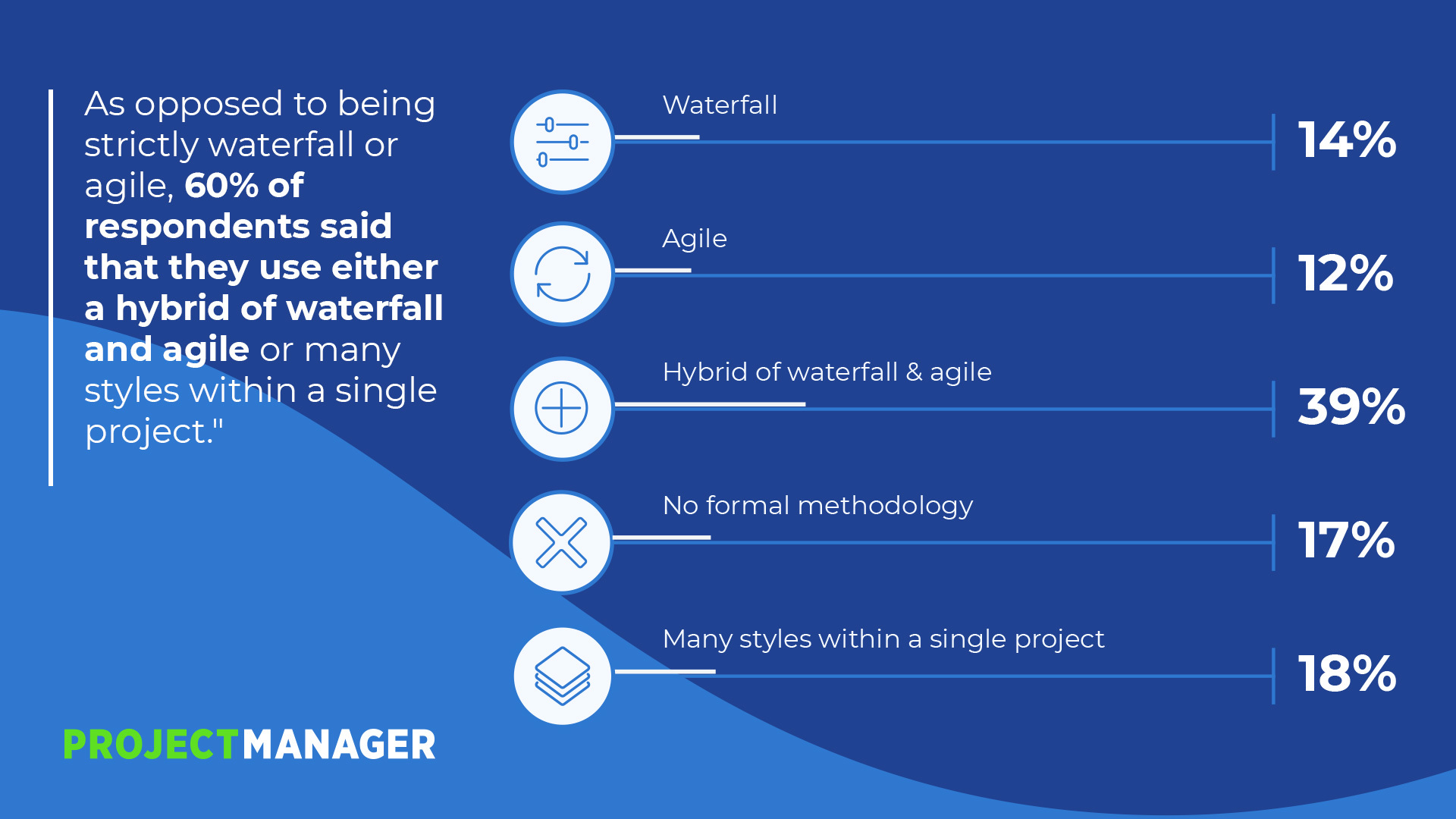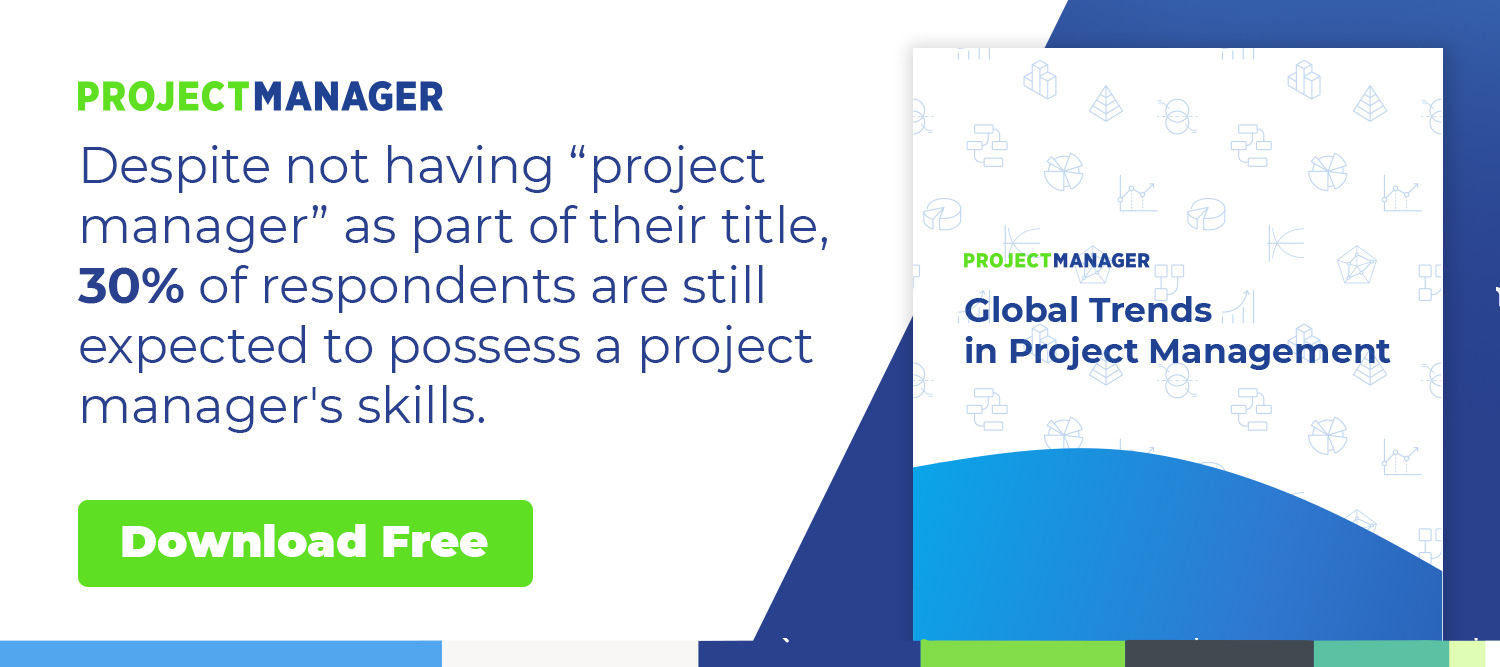The effects of the pandemic have infiltrated every industry, and project management is no exception. The industry continues to evolve. Project management trends that were once standard are slowly being replaced by modern and innovative solutions.
The new Global Trends in Project Management 2022 report, released today by ProjectManager, taps the insights of more than 600 project management professionals to determine how project teams—and the way they work—are shifting.
Hybrid Work is One of the Top Project Management Trends for 2022
Among the most interesting findings? Emerging project management trends such as the increase in remote work, the utilization of multiple project management methodologies and the decrease in formal project management disciplines all point in one direction: hybrid teams.
Hybrid teams are teams that collaborate in multiple locations and with different methodologies. Organizations are beginning to embrace hybrid teams because they offer flexibility to their employees.
It may sound like a buzz phrase, but hybrid teams are here to stay—and the data from our Global Trends in Project Management 2022 report illustrates this shift in the global workforce. We encourage the project management community at large to leverage these insights for a better, more productive working environment this upcoming year and beyond.

Click here to download our survey report on 2022 project management trends.
Trend #1: Challenges of Remote Work
Perhaps the most readily apparent project management trend is that more and more teams are transitioning into a remote working environment; not only in the United States, but across the globe. Of our survey participants, 59% currently work remotely, with this number likely to increase moving forward.
With a growing number of employees transitioning into a remote working environment, there are fewer opportunities for face-to-face communication. This presents an opening for collaboration platforms that keep projects progressing accurately and within budget.
Another challenge of remote work is finding an effective way to collaborate across teams. Remote workers need the ability to work well within their own team, of course. But they also need to communicate across multiple departments to deliver business value. This shift requires seamless collaboration and effective communication to ensure all individuals are on the same page.
Other noteworthy challenges of remote work include distractions such as pets, children and significant others, less socialization with coworkers (which impedes team building and camaraderie), less work-life balance, time zone differences, and feelings of isolation. As the world continues to transition into remote work, additional tools and methodologies will need to emerge.
For additional information and statistics on remote work, be sure to download our free Global Trends in Project Management 2022 report.
Trend #2: There’s No Right or Wrong Project Management Methodologies
Our report also highlights a shift away from a single project management methodology in favor of more hybrid approaches. Traditional project management tools, such as a Gantt chart or a kanban board, have been around for decades. Project managers use them to bring consistent success to their projects across the globe.
Many projects also use either agile or waterfall methodologies when establishing plans at the outset of the project.

However, today’s changing landscape requires additional flexibility that these traditional approaches may not provide. Many of our respondents noted using a combination of approaches (or no formal methodology at all) in how they approach their new projects. Tapping into multiple tools and methodologies, instead of sticking to one, has become a project management trend across all industries.
Trend #3: A Mixture of Formal & Informal Project Managers
As a leading project management software, ProjectManager is well aware that the line between formal project managers and individuals who manage projects is blurry. Many individuals end up taking on roles that require them to act as informal project managers—despite not having an official “project manager” title.
Our findings may surprise you. Of the 630 individuals surveyed, almost 30% were not hired with the intention of being full-time project managers. Despite not having “project manager” as part of their title, these individuals are still expected to possess a project manager’s skills.

Individuals that possess strong managerial skills such as leadership, time management, effective communication, risk management, etc. may find themselves managing ad-hoc projects in a hybrid working environment.
The Future of Project Management Is Hybrid
Hybrid teams are all around us, regardless of the industry. Remote working environments, combining multiple methodologies and mixing formal and informal project managers have opened the door for dynamic, hybrid teams.
As the hybrid working environment continues to evolve, traditional ways of managing teams are no longer cutting it. With the right software tools and platforms, hybrid teams can effectively manage projects despite team members’ locations or working preferences.
Looking Ahead to Project Management Trends in 2022
Our report findings have been incredibly helpful in determining future trends in the project management space, and we’ve only covered a small portion of the pertinent survey topics in this blog. Since the onset of the pandemic, many hybrid teams are thriving thanks to the right tools.
Here are some additional questions that our trends report covers:
- What are the biggest challenges in project management today?
- How are teams managing projects today, and will those approaches be successful in the new hybrid world?
- What work methodologies are most prevalent among project teams?
- What industries are paving the way for hybrid teams?
- What are the biggest hurdles standing in the way of effective collaboration?
- What is the project/process maturity level of most project teams?
If you want to learn more about the future of project management, we encourage you to download the full version of our report! This comprehensive study includes findings that can help you drive the future direction of project management at your company.
For the report, we surveyed 630 project management professionals across a range of industries to ensure statistical relevance. For additional information about our study, please email [email protected].

